Singapore, U.S. Strengthen Defense Ties with Launch of New Joint Master’s Degree at NPS
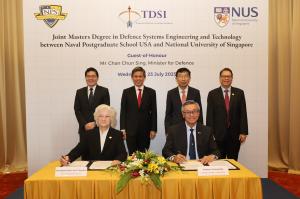
National University of Singapore (NUS) President professor Tan Eng Chye and Naval Postgraduate School (NPS) President retired U.S. Navy Vice Adm. Ann E. Rondeau, Ed.D. signed a new joint degree partnership.
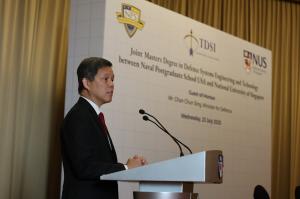
Singapore Minister for Defence Chan Chun Sing provides remarks at the ceremony for a new joint degree program between the National University of Singapore’s, Temasek Defence Systems Institute and the Naval Postgraduate School, July 23.
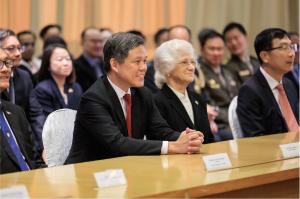
Singapore Minister for Defence Chan Chun Sing and Naval Postgraduate School President retired U.S. Navy Vice Adm. Ann E. Rondeau, Ed.D., listen remarks at the signing ceremony for a new joint degree.
Singapore Minister for Defence Chan Chun Sing, and U.S. Navy Adm. Samuel J. Paparo, commander, U.S. Indo-Pacific Command, hailed the new academic partnership.
MONTEREY, CA, UNITED STATES, August 6, 2025 /EINPresswire.com/ -- In a milestone for international defense collaboration and education, the Temasek Defence Systems Institute (TDSI) at the National University of Singapore (NUS) and the Naval Postgraduate School (NPS) formally launched a new joint degree program, underscoring decades of trusted partnership and a shared commitment to preparing future leaders for the complexities of modern warfare.
NUS president professor Tan Eng Chye and NPS president retired U.S. Navy Vice Adm. Ann E. Rondeau, Ed.D. signed the new partnership agreement during a ceremony held in Singapore at NUS, July 23. Senior leaders in attendance included the Singapore Minister for Defence (MINDEF) Chan Chun Sing; MINDEF Permanent Secretary (Defence Development) Melvyn Ong; TDSI Board Chairman and Chief Defence Scientist Tan Peng Yam; dean of the NUS College of Design and Engineering professor Teo Kie Leong; as well as Lisa S. Liao, U.S. Embassy Chargé d’Affaires and U.S. Navy Capt. Manuel Picon, Defense Attaché.
“Over the years, the Naval Postgraduate School has always held a special place in our Singapore defense ecosystem,” said Sing. “For generations, many of our defense personnel have gone to the Naval Postgraduate School and brought back networks and knowledge to help build our own defense ecosystem.”
The joint program is designed to equip defense professionals with cross-disciplinary knowledge and system-level competencies, with a particular emphasis on digital systems engineering, emerging technologies, and strategic systems thinking. With rapid technological change reshaping the character of warfare, both institutions emphasized the urgency of adapting defense education to reflect the evolving global security environment.
“This momentous milestone reflects the strength of the enduring collaboration between our institutions,” said Rondeau. “We talk about integration, we talk about systems thinking, which is about working these things together with respect for all different points of view to create solutions to problems. Our bonds are deep, and the joint degree we are establishing today is not only a new initiative but also representative of what we are going to become.”
Sing emphasized that the new joint degree would enhance the preparation of defense engineers by focusing on digital systems engineering and systems thinking, which are increasingly vital in today’s rapidly evolving technological and security landscape.
He added that the collaboration reflects the enduring defense ties between Singapore and the United States, rooted in mutual trust and a shared focus on peace, stability, and technology, and noted that many of Singapore’s defense engineers have emerged from this partnership, which dates back more than 50 years, to help strengthen the nation’s military.
Singapore’s formal academic collaboration with NPS began in the early 1970s, with more than 700 Singaporean officers graduating from the school throughout the partnership including current TDSI professor Lui Pao Chuen, a 1973 NPS graduate in operations research. Chuen rose to become Singapore’s Chief Defence Scientist, and was inducted into the NPS Hall of Fame in 2002.
Another milestone in the NPS-TDSI partnership came in 2001 with the establishment of the dual degree program, with an inaugural cohort of 27 graduates. To date, more than 300 Singaporean military officers and 68 U.S. officers have earned degrees from both institutions through the program, with the new joint degree opening avenues to greater collaboration.
“This undertaking is a testament to our vision and commitment to advancing defense education and research at the highest standards,” said Chye. “I am pleased that NUS will be furthering our relationship with NPS, a leading institution for military and defense-related fields, through this joint program.”
For both nations, the strategic value of this collaboration extends far beyond academic credentials. As a maritime nation located at the heart of the Indo-Pacific, Singapore plays a vital role in maintaining open sea lanes and upholding a stable order. U.S. Navy Adm. Samuel J. Paparo, commander, U.S. Indo-Pacific Command, welcomed the development.
“In today’s contested environment, success requires more than just platforms and presence — it depends on people,” said Paparo, also an NPS alumnus. “This joint degree program enhances the intellectual and operational capabilities between our nations, preparing defense leaders who can integrate technology smartly, think critically about complex challenges, and work together to maintain the partnerships that underpin regional security, stability and prosperity.”
Rondeau also highlighted the deeper significance of the collaboration, calling the NPS-TDSI program one of NPS’ proudest traditions for its role in building long-term bonds among U.S. and Singaporean officers across careers and continents. She emphasized that the joint degree not only enhances technical and critical thinking but also strengthens the human dimension of learning by advancing trust and peace through shared values, integration, and mutual understanding.
The International Graduate Programs Office (IGPO) at NPS oversees the educational outreach to allied and partner nations. To date, NPS’ international military alumni network exceeds 7,000 graduates from 128 countries. IGPO deputy director Mowafiq W. Alanazi, Ed.D., emphasized NPS’ long-standing connection with the TDSI program.
“We are stronger together,” said Alanazi. “This joint degree program with NUS stands as a testament to NPS’ status as a global leader in military education. We look forward to welcoming many more Singaporean students in the near future to our growing defense-diverse student body of allied militaries.”
Concluding his remarks at the ceremony, Chan said, “I look forward to the continued partnership between NUS and NPS, and to seeing how our engineers apply their skills to strengthen our national defense.”
With the launch of this new joint degree, NUS and NPS reaffirm their shared commitment to cultivating operationally informed, technologically proficient defense leaders, and to ensuring deterrence through strength, innovation, and enduring friendship.
------------------
Naval Postgraduate School (NPS) is located in Monterey, California, and provides defense-focused graduate education, including classified studies and interdisciplinary research, to advance the operational effectiveness, technological leadership, and warfighting advantage of the U.S Naval service. Established in 1909, NPS offers master’s and doctorate programs to Department of Defense military and civilians, along with international partners, to deliver transformative solutions and innovative leaders through advanced education and research.
LCDR Kristina Wiedemann, USN
Naval Postgraduate School, Public Affairs
831-656-3567
email us here
Visit us on social media:
LinkedIn
Instagram
Facebook
YouTube
X
Legal Disclaimer:
EIN Presswire provides this news content "as is" without warranty of any kind. We do not accept any responsibility or liability for the accuracy, content, images, videos, licenses, completeness, legality, or reliability of the information contained in this article. If you have any complaints or copyright issues related to this article, kindly contact the author above.
Future of Audio Integration: Audfly’s New Directional Sound Modules Set to Redefine Smart Devices
Chaunte Hall featured on Trudy Jacobson's Great American Warriors
Mehmi Financial Group Expands National Business and Equipment Financing Services Across Canada
Więcej ważnych informacji
 Jedynka Newserii
Jedynka Newserii

 Jedynka Newserii
Jedynka Newserii

Handel

Mercosur to tylko wierzchołek góry lodowej. UE ma ponad 40 umów handlowych, które mogą destabilizować rynek rolny
Umowa handlowa między UE a krajami Mercosur może znacząco zaburzyć konkurencję na rynku rolnym i osłabić pozycję unijnych, w tym polskich, producentów – ostrzegają rolnicy i producenci żywności. Umowie sprzeciwia się część krajów unijnych, które domagają się klauzuli ochronnych oraz limitów importowych. – Problemem jest jednak nie tylko ta konkretna umowa. Chodzi o cały system wolnego handlu, który się kumuluje z dziesiątek innych porozumień – podkreśla Andrzej Gantner, wiceprezes Polskiej Federacji Producentów Żywności.
Firma
Dzięki zdalnej weryfikacji tożsamości z wykorzystaniem AI firmy zminimalizowały liczbę oszustw. Rozwiązania wykorzystuje głównie sektor finansowy

Z najnowszych danych Eurostatu wynika, że w 2024 roku 5,9 proc. polskich firm korzystało z rozwiązań z zakresu sztucznej inteligencji. W 2023 roku był to odsetek na poziomie 3,67 proc. Wciąż jednak jest to wynik poniżej średniej unijnej, która wyniosła 13,48 proc. Jednym z obszarów, który cieszy się coraz większym zainteresowaniem wśród przedsiębiorców, jest weryfikacja tożsamości przez AI, zwłaszcza w takich branżach jak bankowość, ubezpieczenia czy turystyka. Jej zastosowanie ma na celu głównie przeciwdziałać oszustwom i spełniać wymogi regulacyjne.
Prawo
Daniel Obajtek: Własne wydobycie i operacyjne magazyny to filary bezpieczeństwa. Zgoda na magazyny gazu poza krajem to rezygnacja z suwerenności energetycznej

Były prezes Orlenu ostrzega przed zmianami w ustawie o zapasach ropy naftowej, produktów naftowych i gazu ziemnego. Jego zdaniem przygotowana przez rząd nowelizacja tzw. ustawy magazynowej i ujednolicanie unijnej polityki energetycznej to zagrożenie dla bezpieczeństwa energetycznego Polski. W jego opinii tylko silna spółka narodowa, własne wydobycie, krajowe magazyny i zbilansowany miks energetyczny zapewnią Polsce bezpieczeństwo i konkurencyjność.
Partner serwisu
Szkolenia

Akademia Newserii
Akademia Newserii to projekt, w ramach którego najlepsi polscy dziennikarze biznesowi, giełdowi oraz lifestylowi, a także szkoleniowcy z wieloletnim doświadczeniem dzielą się swoją wiedzą nt. pracy z mediami.
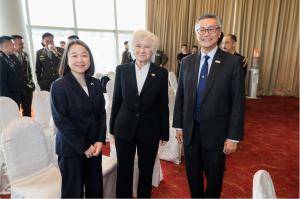
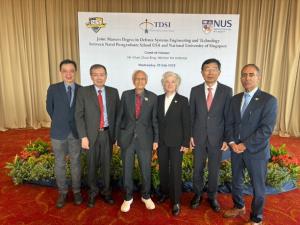




![Nestlé w Polsce podsumowuje wpływ na krajową gospodarkę. Firma wygenerowała 0,6 proc. polskiego PKB [DEPESZA]](https://www.newseria.pl/files/1097841585/fabryka-nesquik_1,w_85,r_png,_small.png)



.gif)

 |
| |
| |
|